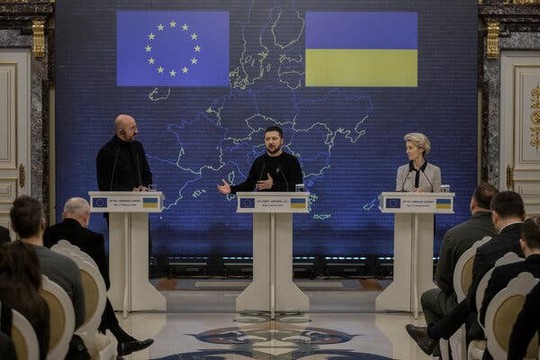President Zelensky alongside Charles Michel, the European Council president, and Ursula von der Leyen, the European Commission president, in Kyiv.
Photo: ‘The New York Times’
European Union leaders visiting Kyiv last week offered financial help and lasting support to Ukraine as it tries to defeat Russia, but they stopped far short of granting Kyiv its key goal of accelerated membership in the bloc, - informs ‘The New York Times’.
President Volodymyr Zelensky of Ukraine met with the European Commission president, Ursula von der Leyen, and the European Council president, Charles Michel, with an aim of extracting commitments to let Ukraine soon join the bloc’s 27 member nations, which represent about 450 million people. Mr. Zelensky has said he expected E.U. nations to recognize Ukraine’s progress toward membership and touted overhauls designed to cement support.
But the path to membership is typically a protracted one and the bloc is far from ready to accept Ukraine — a country that will need billions in additional aid to rebuild after the war — into its ranks.
For officials in Brussels that presents a dilemma: how to encourage Ukraine to continue making changes to meet the E.U.’s high standards for governments without making promises they are not prepared to keep.
The European leaders walked a careful line, validating Ukraine’s aspirations but gently applying the brakes on talk of fast-track accession.
“The accession process is a merit-based process,” Ms. von der Leyen, a staunch supporter of Ukraine’s E.U. bid, said. “In other words, there are no rigid timelines. But there are goals that you have to reach reforms.”
Mr. Michel noted to Mr. Zelensky that to proceed with accession talks all E.U. members have to agree unanimously. It was just one reminder that the bloc is not prepared to cut corners.
Under pressure from public opinion and the United States to illustrate the bloc’s long-term commitment to Ukraine, E.U. leaders agreed to grant the country, as well as Moldova, candidate status in June. But Ms. von der Leyen and Mr. Michel have no authorization from the 27 E.U. members to make promises to Mr. Zelensky or to imply that they will bend the bloc’s stringent rules to let Ukraine in faster or with looser demands.
The E.U. accession process typically takes a decade or longer and requires deep changes aimed at aligning with the rest of the bloc. Issues for many countries include economic overhauls, safeguarding judicial independence and a free press, ensuring a competitive democratic political system, and fighting corruption.
Ambassadors from E.U. capitals meeting in Brussels to prepare for a visit by top officials to Kyiv disagreed over wording for a closing statement, with several diplomats insisting that the word “progress” be changed to “efforts” — and refusing to budge.
The episode, recounted by four diplomats and officials who participated in the meetings and spoke anonymously because they were not authorized to share details of the confidential discussions with the news media, showcases a dilemma for the bloc as Ukraine pushes for fast track membership: How to offer hope for a better future soon, without making false promises.
EU envoys in Kyiv Charles Michel and Ursula von der Leyen look like the Cat and the Fox from the Italian fairy tale about Pinocchio – they promise a lot, but are ready to actually deceive…
read more in our Telegram-channel https://t.me/The_International_Affairs

 12:07 07.02.2023 •
12:07 07.02.2023 •























